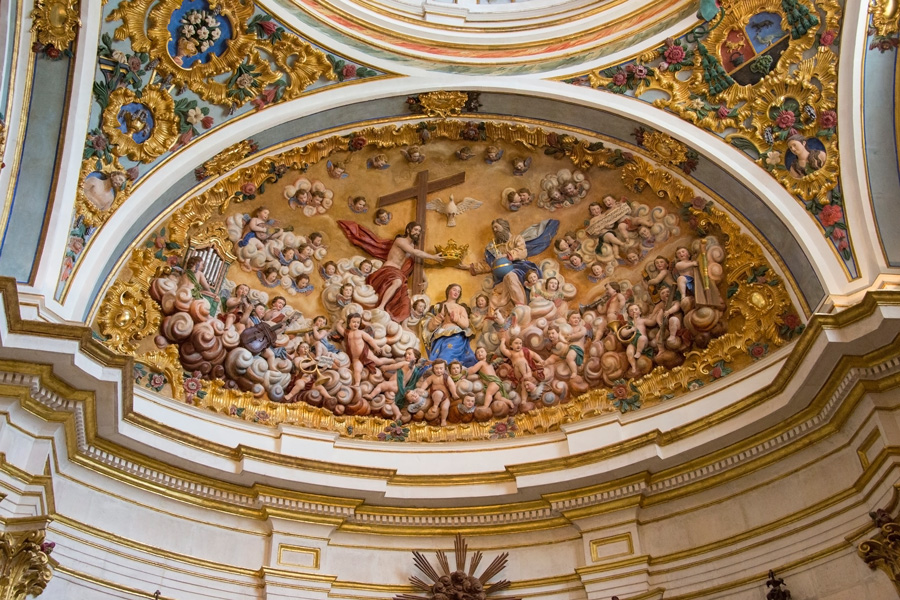
The Solemnity of the Holy Trinity
05-26-2024Weekly ReflectionFr. Tony Okolo C.S.Sp., V.F.Beloved Parishioners,
As I said that I would be sharing spiritual reflection from events and solemnities we celebrate as I take my vacation, today I share with you the mystery of the Holy Trinity. The Easter season is over with Pentecost, which we celebrated last Sunday, and we have returned to the liturgical season of Ordinary Time again. However, today, the first Sunday after the coming of the Holy Spirit, the Church celebrates the Solemnity of the Most Holy Trinity which points us to the meditation of the mystery of the Godhead.
The doctrine of the Holy Trinity is one of the fundamental doctrines of Christianity and the greatest mystery of our faith. The Catechism of the Catholic Church captures the essence of this doctrine thus: “The Church expresses her trinitarian faith by professing a belief in the oneness of God in whom there are three Persons: Father, Son, and Holy Spirit. The three divine Persons are only one God because each of them equally possesses the fullness of the one and indivisible divine nature. They are distinct from each other by reason of the relations which place them in correspondence to each other. The Father generates the Son; the Son is generated by the Father; the Holy Spirit proceeds from the Father and the Son." (CCC 48)
The oldest doctrinal formulation of the Church’s belief in the Trinity is found in the Apostles’ Creed which has served both as the basis of instruction for catechumens and as the Baptismal confession of Faith since the second century. Accordingly, in the mission mandate given by the risen Lord to His disciples, Jesus commanded them to baptize people “in the Name of the Father and of the Son and of the Holy Spirit” (Confer also Matthew 28:19; John 10:30). Reflecting on the economy of human salvation, we understand that the economic Trinity inseparably cooperates in the salvation of mankind. God the Father creates and provides for His creatures. God the Son redeems us and reconciles us with God the Father. He builds a bridge between the human and divine. God the Holy Spirit sanctifies us, strengthens us, comforts us, teaches us, forms us, and guides us to God.
Saint Augustine understands the Trinity as a communion bound together by love. He writes that "You see the Trinity if you see love." And according to him, the Father is the lover, the Son is the loved one and the Holy Spirit is the personification of the very act of loving. More so, Pope Benedict XVI teaches that we humans share in the capacity of the loving relationship of the Trinity. He writes that “The strongest proof that we are made in the image of the Trinity is this: love alone makes us happy because we live in a relationship, and we live to love and to be loved.” The love, unity, and joy in the relationship among the Father, Son, and Holy Spirit should be the supreme model of our relationships within our Christian families. Our families become truly Christian when we live in a relationship of love with God and with others.
Our celebration of the Trinity is our way of lauding God’s generous initiative of creating the world and indeed to creating man in his own image and likeness. Therefore, it impels us to imitate the creative prowess of God which he has devolved to man as the crown of creation and thus commit more specifically to protecting our natural homeland, earth, and other created things that is for the use of man. This is the most contextual concern Pope Francis raises in his encyclical, Laudato Si, and an area of growing interest in the world after the menacing scourge of Covid 19. If we love God, we must protect the works of his hands.
In this solemnity of the Holy Trinity, we are to reflect on the communities in which we belong; our parish; our co-workers; our family relationships; and most of all, our relationship with God. It challenges us to heal the damaging divisions that exist among us and reminds us that we are all one even though we are politically, religiously, culturally, and socially gifted differently. We must allow unity in our diversities, acknowledge, and appreciate our differences, and pull our talents and gifts together to build a better family, Church, and society at large without denying the truth of the gospel. In the words of Pope Francis: “Celebrating the Most Holy Trinity is not so much a theological exercise, but a revolution in our way of life. God, in whom each Person lives for the other in a continual relationship, in continual rapport, not for himself, provokes us to live with others and for others. Today we can ask ourselves if our life reflects the God we believe in: do I, who profess faith in God the Father, Son, and Holy Spirit, truly believe that I need others in order to live, that I need to give myself to others, that I need to serve others? Do I affirm this in words, or do I affirm it with my life?” (Pope Francis. 12/06/22). The mystery of the Trinity should evoke the deepening of our sense of awe for God and radically disabuse our minds from the tendency of taking sacred places, things, and personages for granted. God comes to us every day in our worship and sacraments. Benedict XVI reminds us that “The sign of the Cross and the name of the living God therefore contain the proclamation that generates faith and inspires prayer.”
BACK TO LIST